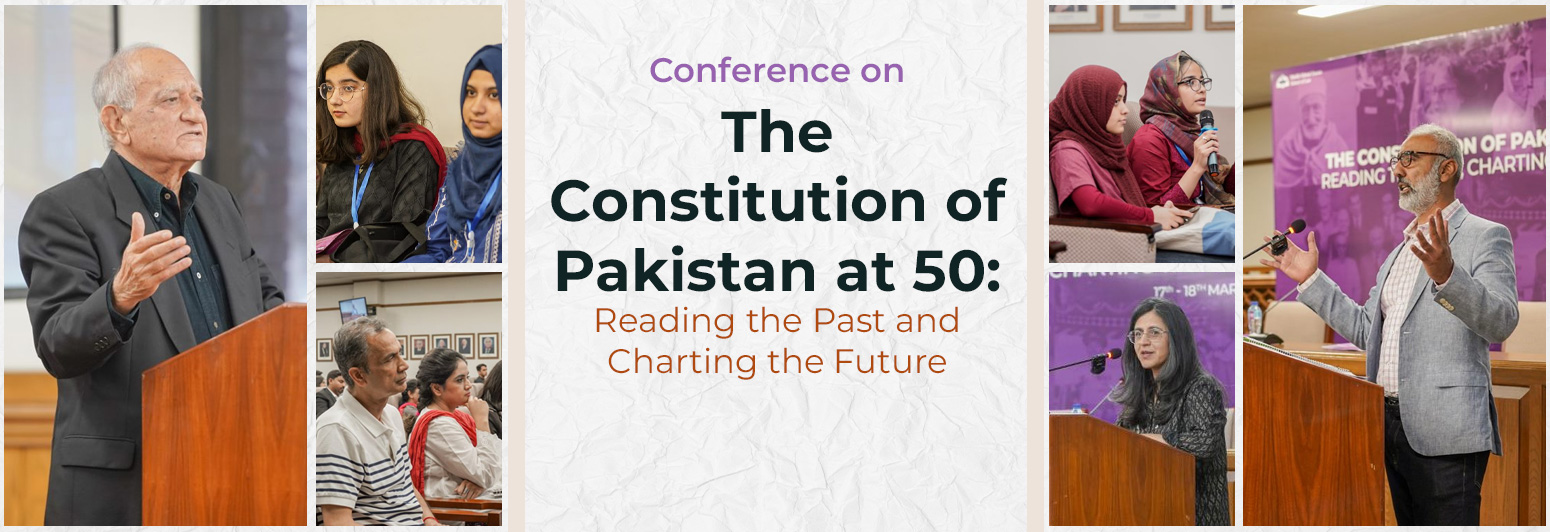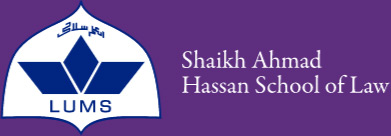Conference on ‘The Constitution of Pakistan at 50: Reading the Past and Charting the Future’
The Shaikh Ahmad Hassan School of Law hosted ‘THE CONSTITUTION OF PAKISTAN AT 50: Reading the Past and Charting the Future’. It was an inter-disciplinary endeavor to critically reflect upon the text and lived life of the 1973 Constitution of Pakistan.
Opening ceremony of the conference at Asifa Irfan Moot Court
Dr. Parvez Hassan (Senior Advocate, Supreme Court of Pakistan and Member, Management Committee LUMS) offered an inaugural address highlighting a set of challenges that beset the project of realizing a more stable constitutionalism in the country.
Keynote | Pakistan: Constitutional design and process in a divided society
Dr. Moeen Cheema (Associate Professor, Australian National University) provided a keynote address focused on comparative constitutional design. He surveyed the literature and experience of designing instruments and institutions capable of ameliorating conflict in deeply divided societies within the Global South and addressed questions about Pakistan’s experience with federalism, local government and judicial power.
Federalism, Resources, and Minorities
Mr. Ahmad Rafay Alam (Environment Lawyer & activist), Mr Rafiullah Kakar (Member, Planning Commission of Pakistan) and Dr. Sikander Ahmed Shah (Associate Professor, SAHSOL), with Dr. Sadaf Aziz (Dean and Associate Professor, SAHSOL) moderating.
Mr. Alam’s presentation, ‘Natural Resources and Federalism: A real test’ looked at the operation of federalist principles in reference to a long history of inter-provincial water disputes in Pakistan. Mr Kakar’s presentation on ‘Federalism and the Management of Ethnic Conflict’ explored the context of post 18th constitutional amendments from the perspective of Balochistan. Dr Shah presented ongoing research ‘Implementing local centripetalism in Pakistan: A federalist solution for upholding communal democratic values’.
Reasonable Limitations, Restrictions and Rights
The second panel of the conference was moderated by Dr. Adnan Sattar and engaged distinct perspectives on the expanse of rights conferred in the Constitution by way of their breach and omissions in practice.
Dr. Ghazal Asif (Assistant Professor, MGSHSS) presented ‘An Anthropological Engagement with Rights’, focusing on a case study of forced conversion and the multiply conflicting rights that come to the fore where such instances encounter the law.
Ms. Reema Omer presented on ‘Interpreting Fundamental Rights’ describing the limitations and exceptions provided for in the Constitution and drawing into comparison other jurisdictions.
Mr. Salman Akram Raja (Advocate, Supreme Court of Pakistan) examined rights and jurisprudence in Pakistan through his involvement in landmark constitutional cases such as Abdul Waheed vs Asma Jahangir.
The People’s Constitution: The Everyday Life of Law in the Indian Republic
Dr. Rohit De (Associate Professor, Yale University) and his work exploring the lived reality of constitutionalism in India were explored in discussion with Ms Aisha Ahmad (Assistant Professor, SAHSOL). In his book, ‘The People’s Constitution’, Dr. De has filled in the stories of a range of litigants who fought important constitutional battles in India in the early decades after Independence. Through an attentiveness to the strategies, struggles and the social context of these cases, the commitments, hopes and disappointments of constitutional governance are revealed.
Sex, Gender, and State
The last session included the following panelists and It was moderated by Ms Hiba Akbar (Visiting Assistant Professor, SAHSOL). Ms Marva Khan (Assistant Professor, SAHSOL) discussed ‘Feminist Reimagining of the Constitution’ against the ongoing work of compiling the Feminist Judgement volume for Pakistan.
Ms. Sara Malkani (Advocate, High Courts of Pakistan) presented ‘Sex based Discrimination and Article 25 of Pakistan’s Constitution’. She reflected on the application by the supreme court, gaps and limitations of Article 25 (2).
Dr. Sarah Humayun (Assistant Professor, SAHSOL) presented ‘Gender and Sovereignties in Aangan’ considering close attention to Khadija Mastur’s landmark novel. Her presentation insightfully signal to the effacement of women’s subjectivity from the study of law, constitutionalism and the nation.
Closing Ceremony of the Conference
The author of vast and comprehensive writings on the Pakistani constitution, Mr. Hamid Khan (Senior Advocate, Supreme Court of Pakistan) delivered a set of closing remarks that encapsulated some of the major continuing problems of restoring civilian supremacy and constitutional guidance in the country.




